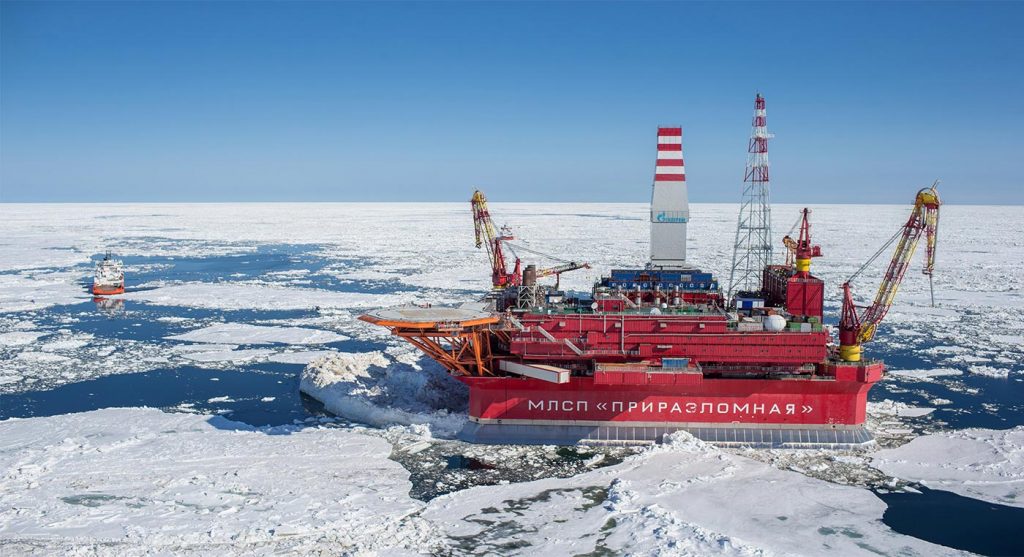Banks And Investors Pouring Billions Into Arctic Oil & Gas Despite Climate Pledges
The likes of BNP Paribas, BlackRock and JPMorgan Chase must heed the instruction of the International Energy

A new report published by NGO Reclaim Finance reveals that commercial banks granted more than $314 billion between 2016 and 2020 to oil and gas companies developing new projects in the Arctic.
Just as the area’s temperatures are rising two to three times faster than in the rest of the world, jeopardising its vital role cooling the rest of the planet, Arctic oil & gas production is set to increase from 11.5m to 15.3m barrels a day if all current prospects are developed, according to the report. This ‘bonanza’ threatens to consume 22% of the world’s remaining 1.5°C carbon budget.
Among the largest non-Russian banks involved, JP Morgan Chase leads with $18.6 billion (between 2016-2020), followed by Barclays ($13.2 billion), Citigroup ($12.2 Billion) and BNP Paribas ($11.8 billion).
As for the investors, BlackRock tops the rankings, with $28.5 billion invested in oil & gas projects in the area, followed by Vanguard and Credit Agricole (via Amundi).

Ironically, 20 of the top 30 banks fuelling expansion in the Arctic region now have so-called Arctic restriction policies. It can also be noted that BNP Paribas, Crédit Agricole, Société Générale, Natixis and HSBC increased their financial services to Arctic developers after adopting an Arctic exclusion policy.
In the recently concluded Monsoon Session of the Indian Parliament the Ministry of Earth Sciences acknowledged that the melting of sea ice in the Arctic is impacting the Indian monsoon and influencing atmospheric conditions on subtropical Asia and the Indian landmass. India Meteorological Department (IMD) has carried out an analysis of observed monsoon rainfall variability and changes of29 States & Union Territory at State and District levels based on the IMD’s observational data of recent 30 years (1989- 2018) during the Southwest monsoon season from June to September (JJAS) and issued a report on 30 March 2020. The reports on observed rainfall variability and its trend for each State and Union Territory are available. With regard to the frequency of heavy rainfall days, significant increasing trend is observed over Saurashtra & Kutch, Southeastern parts of Rajasthan, Northern parts of Tamil Nadu, Northern parts of Andhra Pradesh and adjoining areas of Southwest Odisha, many parts of Chhattisgarh, Southwest Madhya Pradesh, West Bengal, Manipur & Mizoram, Konkan & Goa and Uttarakhand. Five states viz., Uttar Pradesh, Bihar, West Bengal, Meghalaya and Nagaland have shown significant decreasing trends in southwest monsoon rainfall during the recent 30 years period (1989-2018).
Oil and gas companies are set to ramp up production in the Arctic by 20% in the next five years (1), according to a new report from NGO Reclaim Finance (2). These Arctic ‘expansionists’ (3) – such as Gazprom, Total and ConocoPhillips (4) – have, it is revealed, been backed by hundreds of billions of dollars of support from banks and investors, despite many holding commitments to restrict fossil financing in the region. The report details $314bn of loans and underwriting from commercial banks to Arctic oil and gas expansionists between 2016 and 2020. JPMorgan Chase was the biggest culprit ($18.6bn), with Barclays ($13.2bn), Citigroup ($12.2 bn) and BNP Paribas ($11.8bn) also featuring prominently. Investors are also facilitating the deadly oil and gas boom, holding around $272bn in Arctic fossil developers as of March 2021, with BlackRock ($28.5bn), Vanguard ($21.6bn) and Amundi ($12.9bn) leading the pack, all without Arctic exclusion policies. The findings come just weeks after the International Panel on Climate Change warned of accelerating climate breakdown in the Arctic, with temperatures rising twice as quickly as elsewhere, while NASA is set to release its annual survey of Arctic sea ice loss in the coming days. Worryingly, the Arctic oil and gas ‘bonanza’ threatens to consume 22% of the world’s remaining 1.5°C carbon budget, while devastating local communities and biodiversity.
Commenting on the findings, campaigner at Reclaim Finance and report author Alix Mazounie said:“The Arctic is a climate bomb, and our research shows that the oil and gas industry is hellbent onsetting it off, thus blowing up our chances of avoiding runaway climate breakdown. But they are not the only culprits: financial institutions have bankrolled these companies, making a mockery of their own climate commitments. Since the oil & gas tigers won’t change their stripes, the likes of BNP Paribas, BlackRock and JPMorgan Chase must heed the instruction of the International Energy Agency and cut off the taps.”
Despite numerous commitments from financial institutions not to support oil and gas extraction in the Arctic, the report lays bare their fundamental design flaws. Thus while 20 of the top 30 banksfueling expansion in the Arctic region have so-called Arctic restriction policies, not a single one excludes support to companies developing new oil and gas projects in the region. Notably, HSBC and BNP Paribas were the top financiers of Arctic expansionists in 2020, despite adopting Arctic exclusion policies early on compared to their peers.
The report’s authors ascribe the fault to highly porous policies. Financial institutions such as AXA and Morgan Stanley have adopted highly limited definitions of the Arctic which permit ongoingexpansion, while Goldman Sachs and Crédit Agricole are among several financial players restricting financing only to oil projects, thereby permitting fossil gas, against the clear mandate of the IEA’s 1.5°C scenario. Crucially, policies often fail to effectively cover corporate financing, the major source of Arctic oil and gas financing.
Views expressed here are those of Dr. Seema Javed, a known Environmentalist, Journalist and Communications Expert




